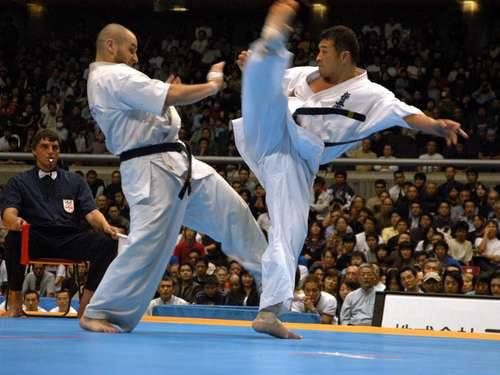1. Keep Your Center
It’s been said that the mightiest person is the one who has control over his or her emotions. That’s essentially what it means to keep your center. I named my school the Satori Academy of Martial Arts. Our definition of satori is “in the moment, at your best.” This refers to a present-minded state of consciousness in which you have mental clarity, physical energy and emotional tranquility. In Western sports, this is referred to as “being in the zone.” Imagine how much you could accomplish if you lived the majority of your life in this state! How enjoyable would life be?
It may not be realistic to think you can spend your whole life at your best, but you certainly can increase the amount of time you spend there. A good way to start is to focus on the six pillars of health each day.
• Pillar No. 1: Exercise. Try to do something physical every day, preferably involving strength, flexibility and endurance.
• Pillar No. 2: Rest. Do your best to get adequate sleep. Sleep deprivation can have an extremely negative effect on your health.
• Pillar No. 3: Nutrition. Take time to learn which foods your body thrives on and which you should avoid.
• Pillar No. 4: Stress management. Everyone experiences stress, but the ability to manage it effectively is the key to good health.
• Pillar No. 5: Risk avoidance. This refers to actions like wearing your seatbelt, washing your hands and minimizing your exposure to dangerous activities.
• Pillar No. 6: Recharging. Recharging refers to the importance of scheduling enjoyable downtime in your life, which helps keep everything in balance.
Once your health is in order, maintaining emotional composure becomes much easier. The next step is being mindful of your emotions. Becoming aware of the fact that you’re experiencing a negative emotion, rather than just reacting to it, means you’re getting better at maintaining your center.
2.Value Your Relationships Above All Else
It’s always preferable to have friends rather than enemies. Having friends and friendly acquaintances not only makes life more enjoyable but also opens more doors wherever you go. A key ingredient to expanding your circle of friends is to go out of your way to bring value to all your relationships. Instead of asking yourself what a relationship can do for you, ask what you can do for that relationship.
Another crucial ingredient in strengthening your relationships is to make other people feel important when you’re with them. People appreciate being appreciated and value being valued.
3.Know Where You’re Going
It’s hard to know if you’re doing well if you don’t know where you want to go. That’s why creating a clear vision for yourself and your future is important. Make sure your vision has a purpose because when that purpose is clear, it’s much easier to maintain motivation. Don’t concern yourself too much with the details at this point; just dream big. Create a vision and visit it often.
4. Know-How You’re Going to Get There
Once you know where you’re going (my third key), the next step is figuring out how you’re going to get there. You don’t need to know every detail; you just need to begin taking steps in the right direction. Remember that motivation follows action. There’s something magical about taking that first step. Plan out the next step, and the step after that, day by day. Before you know it, you will have made great progress.
There are so many applications for this practice in the business of running a martial arts school. Imagine if your goal is to get 20 new members in the next month. How are you going to get there? One way is to work backward.
You might need 50 inquiries to net 20 new members. So you have to decide where these 50 inquiries will come from. If you’re planning to get 10 of the leads from birthday parties, how many parties will you need to book to make that happen? If you plan to get 12 leads from referrals, how many current students do you need to ask for that to happen? Once you determine that, you have an actionable plan for how you’re going to get there.
5. Keep Moving Forward
It’s important to remember that anything worth having is worth working for. Nothing worthwhile is ever easy. There are always going to be obstacles. There are always going to be setbacks. That’s part of the process.
Remember that as long as you’re getting up and moving forward, there is no failure. It’s important to not fear moving forward slowly. The only thing you should fear is standing still. As long as you’re making progress, even slow progress, you’re OK.
For success to happen, you have to cultivate the belief that your best years are ahead of you. It seems that I frequently end up in conversations with people who are telling me how great their life used to be. They tell me that business used to be so much better, that they used to be able to run so much faster or that they used to have much more fun.
While I enjoy reminiscing as much as the next person, I think that spending too much time longing for past greatness keeps us from realizing our future potential. It keeps us from moving forward. It sends a message to our subconscious that things will never be as good as they used to be.
I believe that it’s crucial to embrace the mindset that our best years are still ahead of us. If we can affirm this on a regular basis, we set ourselves up for opportunities we might not otherwise see. And we keep moving forward.
So the next time you find yourself stuck and in need of clarity with respect to which way you should go, just remember to keep your center, value your relationships above all else, know where you’re going, know how you’re going to get there and keep moving forward.
We can always do more than we think we can. Don’t let your fears and doubts keep you from an amazing life. If you can adopt and embrace these five keys, you’ll reach a whole new level of success. And while you’re at it, do your best to enjoy the process and try to bring your “A” game to all that you do.
By Dave Kovar



